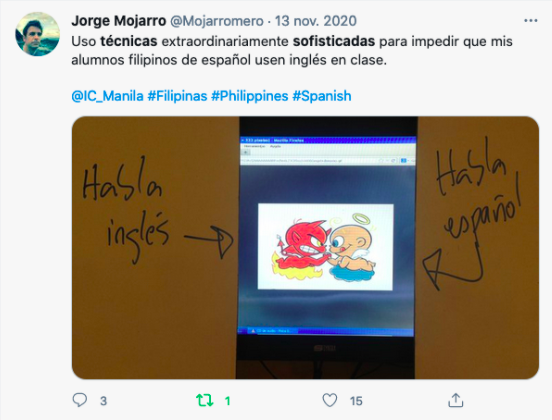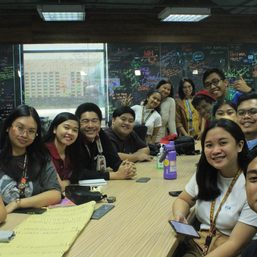SUMMARY
This is AI generated summarization, which may have errors. For context, always refer to the full article.
![[OPINION] Why I condemn language shaming](https://www.rappler.com/tachyon/2021/03/spanish-english.jpg)
Below is an example of language shaming. It is clear to my conscience that we need to pay attention to such cases, however they may be expressed, in seriousness or in jest.
As a Philology student, I was really appalled by the message shown in the image, and it seemed to me that Mr. Jorge Mojarro, the professor who used the so-called “sophisticated technique,” was proud of it and didn’t think about the damaging consequences.

Last February 26, I sent an email to Instituto Cervantes, the institution where the Spanish professor teaches, asking them to take action on the subject matter. As I await their response, I would like to call out their teachers who use discrimination as a form of pedagogical technique.
While I personally was not in Mr. Romero’s class, in 2013 I had experienced linguistic discrimination in the hands of one of Instituto’s teachers. I remember my professor telling us that using the lexicon outside of the peninsular variety was wrong, and that she would penalize us if we uttered a word of it.
This is one of the problems facing language teaching in general, and such prescriptivism and obsession with norms established by governing bodies is actually counterproductive, as native speakers do not speak the established and academic “norm.” After all, the Real Academia Española can only recommend, but not impose, norms, as each dialect has its own.
Going back to Mr. Mojarro Romero’s case, he, of all people, especially as a philologist, should know that prejudices are made by the speakers, and not by the language itself. With that said, languages are not inherently discriminatory; it’s how speakers use the linguistic system. So by saying that Spanish is “good,” and English is “bad,” he, as a speaker, is giving those attributes to these linguistic systems, and not the languages per se.
I am appalled as a Philology student, because I believe that all languages deserve fair and equal treatment, and no language is better nor worse than the other. Like I mentioned earlier, the message, whether in jest or in all seriousness, is discriminatory whatever angle or perspective you look at it.
Furthermore, given our history with Spain, we are a misfit among its colonies, as we do not speak the language anymore. However, it is not the English language’s fault, but rather its speakers, the Americans, for their effective brainwashing during the first few decades of the 20th century. With that said, I also think that it’s important for Filipinos to learn Spanish; however, I cannot promote the language at the cost of other Philippine languages or at the cost of Philippine English.
In conclusion, however precarious our relationship is with Spain, and however tumultuous ours is with the United States, they have left us with a good literary and cultural heritage, alongside the indigenous, that we need to appreciate as Filipinos. We must not give in to the black-and-white thinking of our colonial past, but rather understand the grey areas, because not everything can be simplified, and simple historical data on its own can have its own complexities.
I hope to bring awareness about this matter, because discrimination in whatever form is not okay, and it should be eradicated in one form or another. We must be vocal about it, because as the philosopher-writer Edmund Burke once said: “The only thing necessary for the triumph of evil is for good men to do nothing.” If we don’t do anything about discrimination, it will destroy our social achievements and society a thousand times.
As a call to action, I have started a petition addressed to Instituto Cervantes de Manila to put into question these harmful practices inside their own classrooms. I also hope this could be the starting point for conversations on language discrimination and shaming, not only inside classrooms, but also in everyday social interaction. The latter is the type of discrimination that is not usually talked about by mainstream media, and could lead to irreversible consequences such as: 1) being discouraged from using a language, or abandoning a language; 2) constant insecurity; 3) the amplification of xenophobia and racism; and 4) the risk of language death and extinction.
Languages are windows to a person’s culture. They are a reflection of a person’s being. I think it is important to treat them as living, intangible treasures. – Rappler.com
Jervi Gabriel Lopez is currently a Spanish Philology student in Spain and a serious advocate for the protection of all languages.
Add a comment
How does this make you feel?
![[OPINION] The guilt of being born and raised Filipino, but having English as your first language](https://www.rappler.com/tachyon/2020/08/english-first-language-august-18-2020.jpg?fit=449%2C449)
![[OPINION] Education for life: Weaving ethics in all subject areas](https://www.rappler.com/tachyon/2024/03/Education-for-Life-Weaving-Ethics-in-All-Subject-Domains.jpg?resize=257%2C257&crop_strategy=attention)
![[OPINION] Limited intake of international students: Is Canada knee-capping its future?](https://www.rappler.com/tachyon/2024/02/tl-canada-forgeign-student-cap-02232024-2.jpg?resize=257%2C257&crop_strategy=attention)

![[Rappler Investigates] Who’s fooling who?](https://www.rappler.com/tachyon/2024/02/rodrigo-sara-duterte-2019.jpeg?resize=257%2C257&crop=167px%2C0px%2C900px%2C900px)
![[EDITORIAL] Ang break-up Valentines ni Sara at Marcos](https://www.rappler.com/tachyon/2024/02/animated-2024-valentines-day-political-divorce-carousel.jpg?resize=257%2C257&crop_strategy=attention)
There are no comments yet. Add your comment to start the conversation.